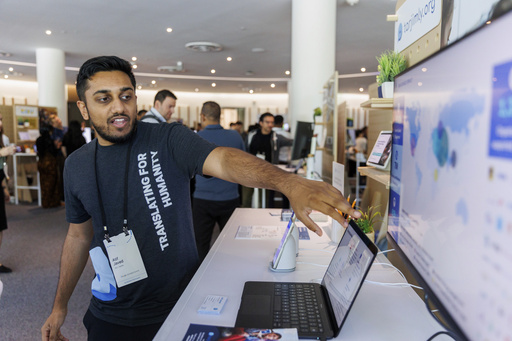
Refugees from countries like Eritrea and Myanmar often face challenges in accessing accurate translations and interpreters familiar with their less-common languages during resettlement. To address this issue, a nonprofit called Tarjimly, likened to an “Uber for translators,” has partnered with artificial intelligence to enhance its services. Through this partnership, volunteers can quickly respond to translation needs while also training AI models to improve language nuances through shared data and corrections from one-on-one calls.
Atif Javed, co-founder of Tarjimly, emphasizes the importance of maintaining a human touch in the language assistance provided to refugees. He believes that the organization’s focus on languages commonly spoken in the Global South, like Dari and Pashto, fills a crucial gap in services dominated by English. By connecting refugees with on-demand interpreters for meetings with various officials and anonymizing conversations for privacy, Tarjimly aims to foster effective communication in sensitive situations.
Many of Tarjimly’s 60,000 volunteers are multilingual refugees themselves, offering a deeper understanding of not only the languages but also the underlying crises driving displacement. For instance, Roza Tesfazion, an Eritrean interpreter, shares her language skills to assist others at no cost due to her personal connection with the emotional challenges faced by refugees. The nonprofit collaborates with established humanitarian organizations like Catholic Charities and the International Rescue Committee to support vulnerable populations in need of language assistance.
While Tarjimly integrates artificial intelligence tools, such as the “First Pass” translation tool, the organization acknowledges the essential role of human interpreters in comprehending the nuances of individuals’ life situations. Data & Society researcher Ranjit Singh underscores the importance of combining technology with human interaction, particularly in translation services, which involve both linguistic accuracy and empathy towards individuals’ experiences.
Javed’s background of volunteering with Arabic speakers in refugee camps inspired the creation of Tarjimly, reflecting the significance of personal experiences in driving impactful philanthropic initiatives. Recognized for its leadership in leveraging technology for humanitarian purposes, Tarjimly received a substantial grant from Google.org to further enhance its language resources. Although AI can offer valuable tools for nonprofits, Elevate Prize Foundation CEO Carolina Garcìa Jayaram emphasizes the necessity of maintaining a balance between technological advancements and human-centered approaches to address critical issues faced by vulnerable communities.
Tarjimly’s innovative approach to language support for refugees demonstrates how AI can complement and enhance traditional assistance methods. By prioritizing the human aspect of communication and understanding, the organization aims to bridge linguistic barriers and provide meaningful support to those navigating challenging circumstances during resettlement.
